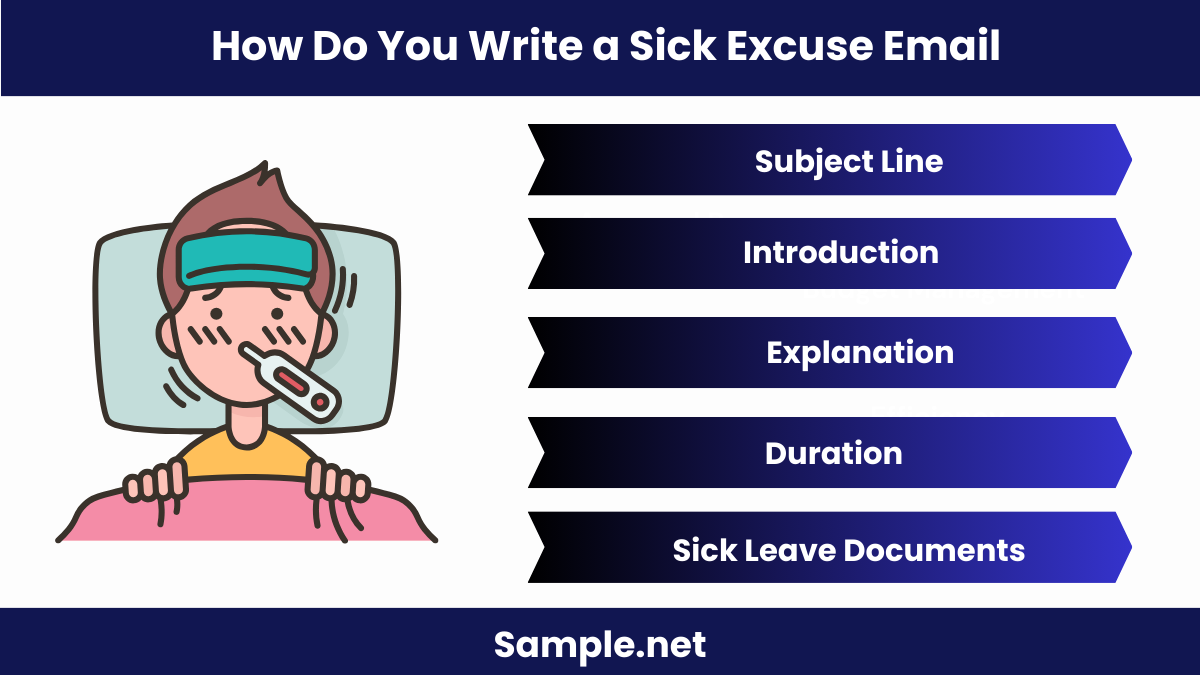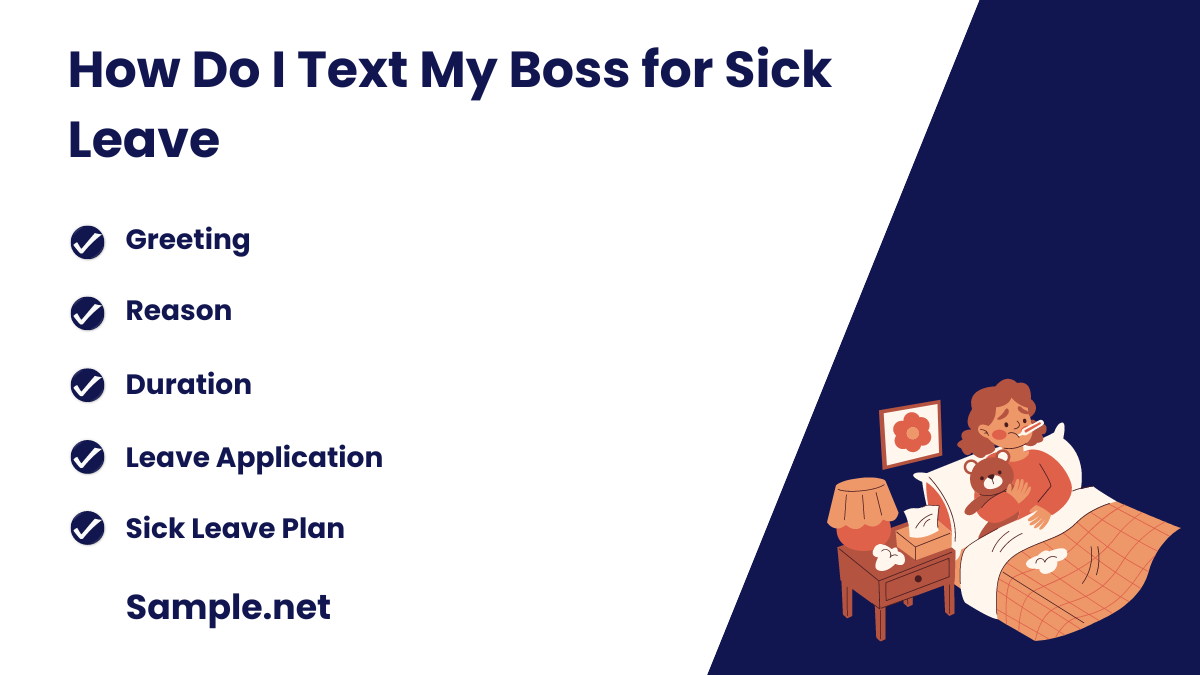Sick Leave Email
-
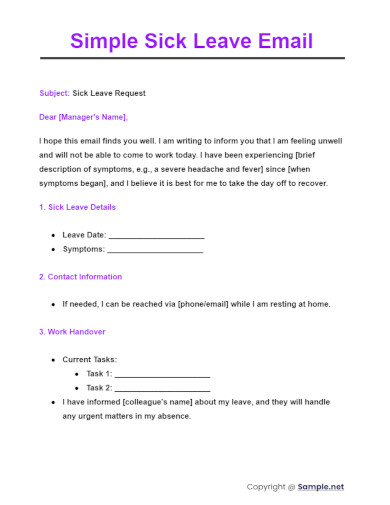
Simple Sick Leave Email
download now -
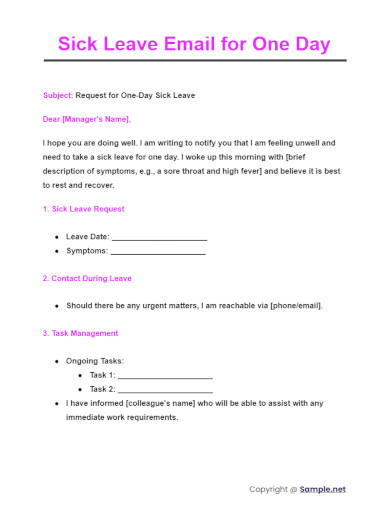
Sick Leave Email for One Day
download now -
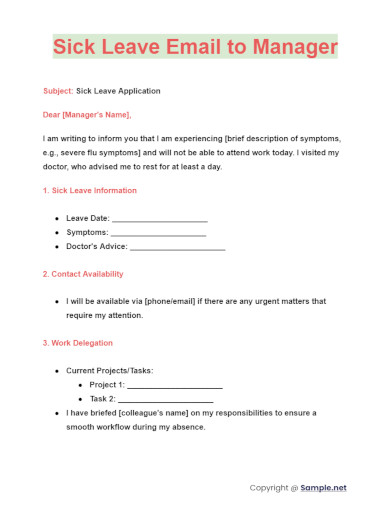
Sick Leave Email to Manager
download now -
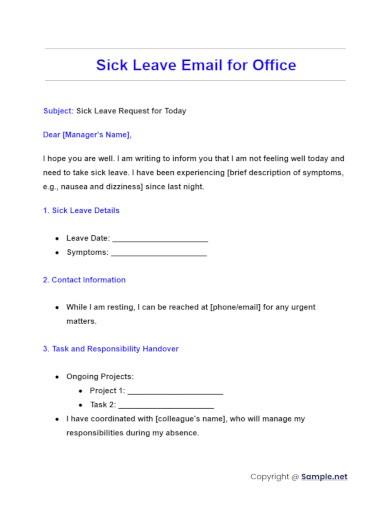
Sick Leave Email for Office
download now -
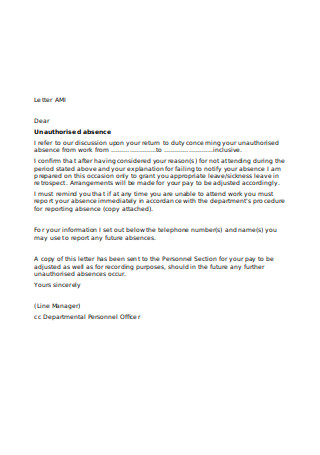
Letter to Employee Granting Sickness Leave
download now -

Sick Leave Email Letter
download now -
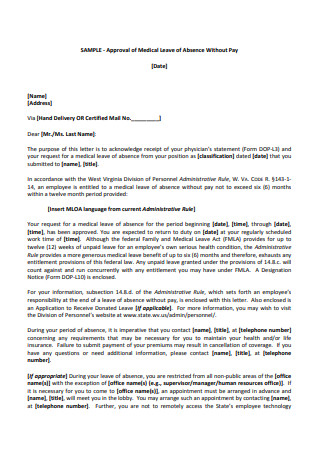
Leave of Absence Approval
download now -
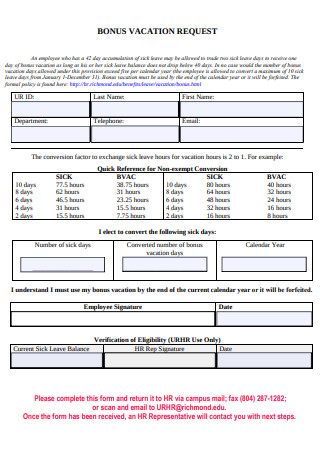
Bonus Vacation Request Form
download now -
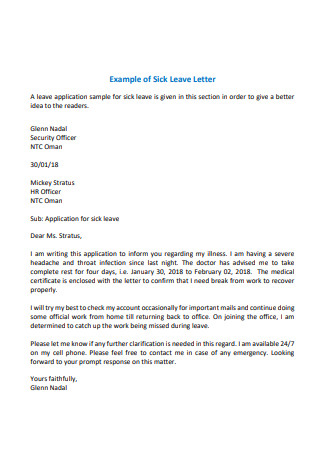
Example of Sick Leave Letter
download now -
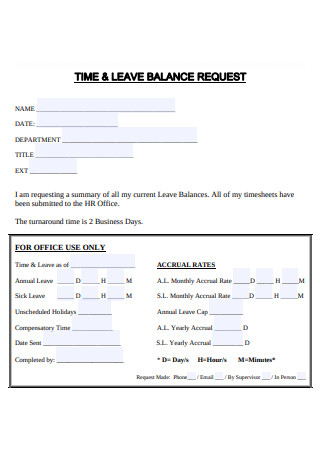
Time and Leave Balance Request
download now -
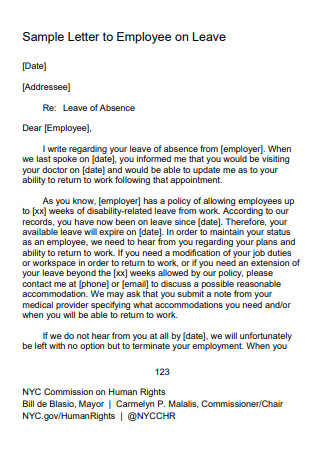
Sample Letter to Employee on Leave
download now -
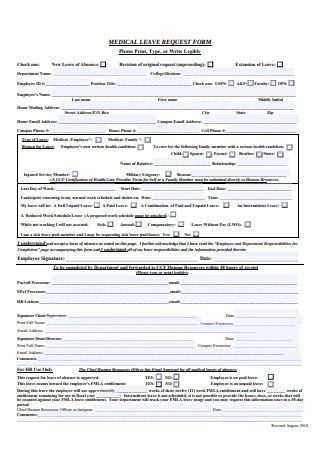
Medical Leave Request Form
download now -
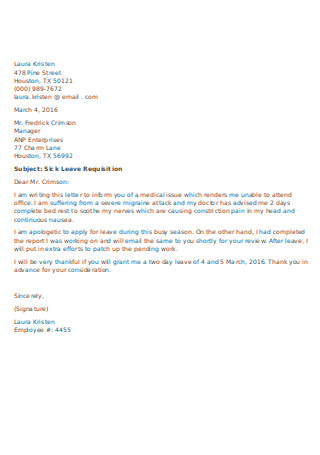
Sick Leave Requisition
download now -
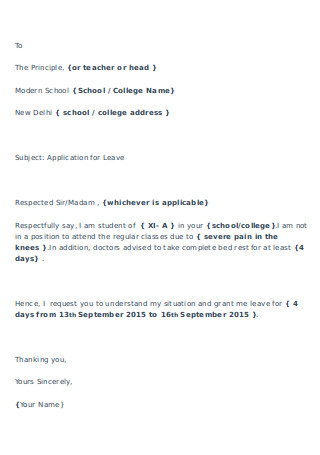
Formal Sick Leave Letter for School
download now -
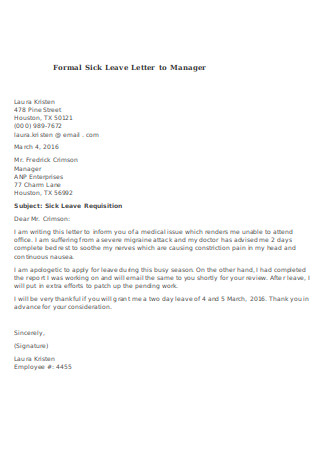
Formal Sick Leave Letter to Manager
download now -
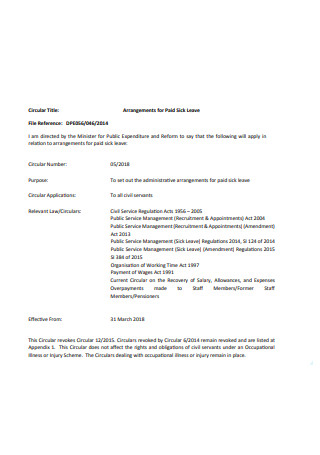
Arrangements for Paid Sick Leave
download now -
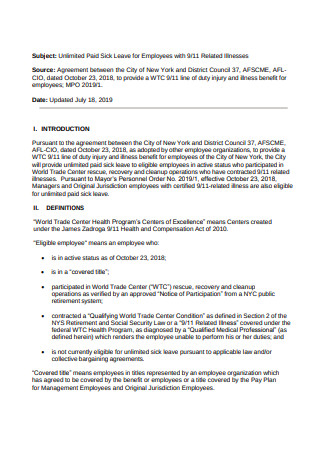
Paid Sick Leave for Employees
download now -
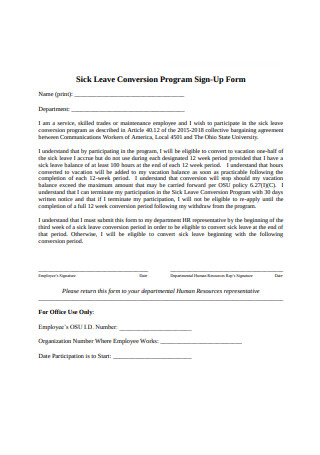
Sick Leave Conversion Program Sign-Up Form
download now -
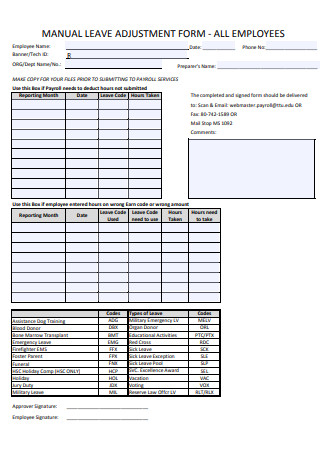
Manual Leave Adjustment Form
download now
FREE Sick Leave Email s to Download
Sick Leave Email Format
Sick Leave Email
What is Sick Leave Email?
Reasons to Take Sick Leave of Absence
How to Write a Sick Leave Email
The Dos and Don’ts of a Sick Leave Email
How Do You Politely Email Sick Leave?
How Do You Write a Sick Excuse Email?
How Do I Inform My Sick Leave?
How Do I Message My Boss for Sick Leave?
How Do I Text My Boss for Sick Leave?
How Do You Send an Off Sick Email?
How to Apologize for Being Sick?
What Are Some Believable Excuses?
How to Write a Sick Text?
Do I Have to Call in Sick Every Day?
Can You Get Fired for Calling in Sick?
Download Sick Leave Email Bundle
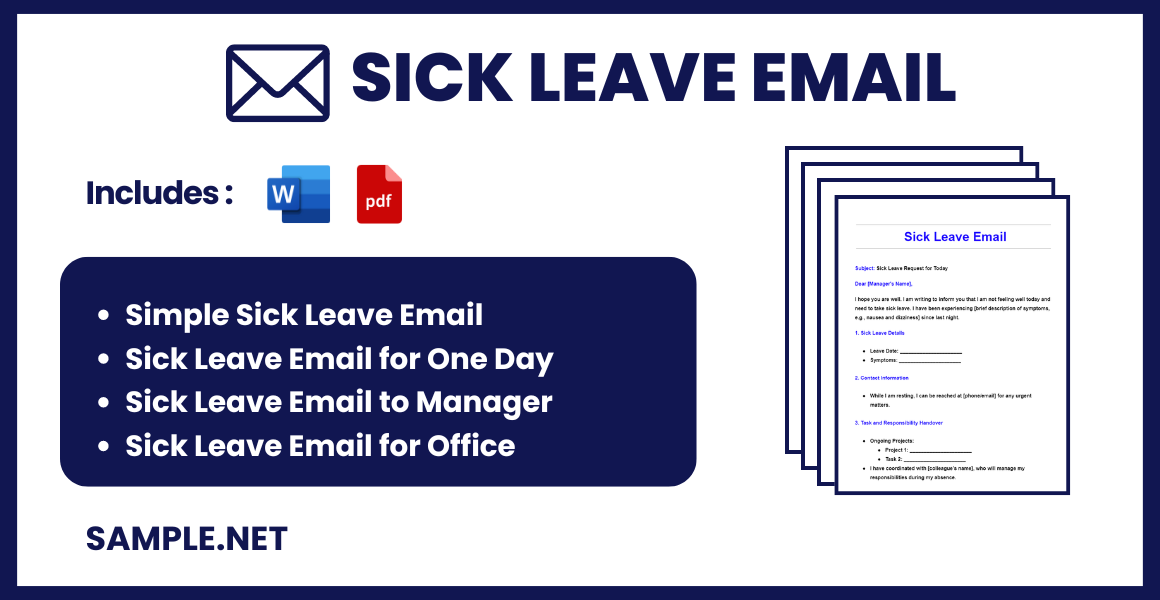
Sick Leave Email Format
Subject: Sick Leave Request
Dear [Supervisor’s Name],
1. Reason for Leave
- Brief Explanation of Illness
- Mention of Doctor’s Visit (if applicable)
2. Duration of Leave
- Start Date and End Date
- Expected Return Date
3. Contact Information
- How You Can Be Reached (if necessary)
- Alternate Contact Person
4. Work Handover
- Current Work Status
- Arrangements for Coverage
5. Conclusion
- Appreciation for Understanding
- Offer to Provide Documentation (if needed)
Best regards,
[Your Name]
What is Sick Leave Email?
A Sick Leave Email is a formal communication sent to an employer or supervisor to inform them about your illness and inability to attend work. This email typically includes the reason for the leave, the duration, and any relevant Sick Leave Plan to manage your responsibilities in your absence. It ensures clear communication and helps maintain professional standards.
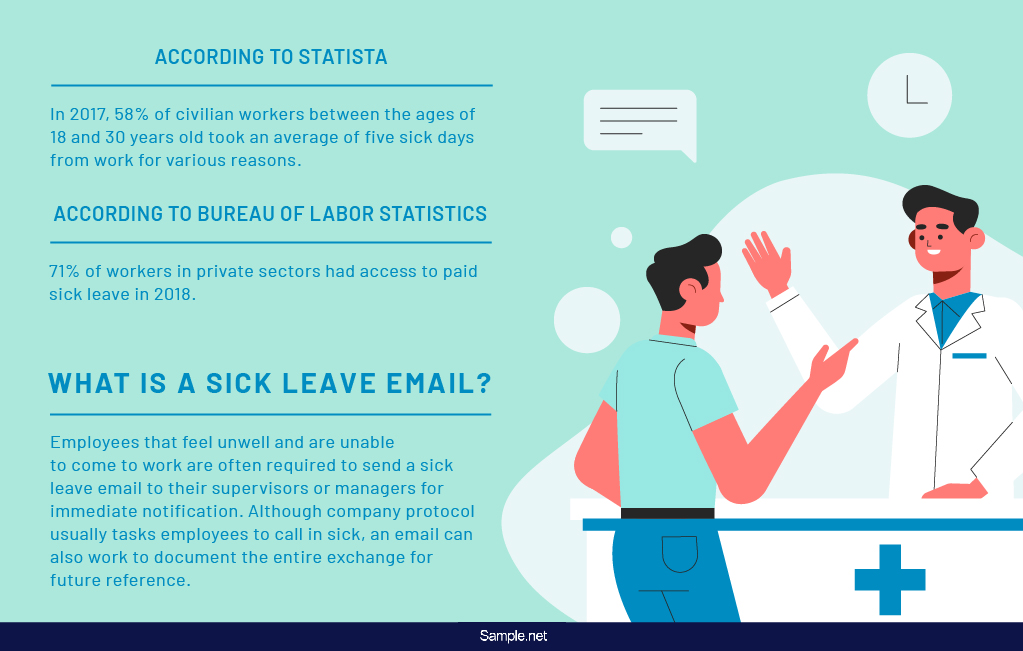
Reasons to Take Sick Leave of Absence
A 2017 study by Statista revealed that 58% of civilian workers between the ages of 18 and 30 years old took an average of five sick days from work for various reasons. Some people wake up with a runny nose and a slight fever but still think they’re capable of doing their job. While you may manage to survive the day without being sent home, you’re also exposing the people around you to whatever disease you are carrying. If you don’t think that what you have is a valid excuse to miss work, you might want to take the following reasons into account.
How to Write a Sick Leave Email
According to the Bureau of Labor Statistics, 71% of workers in private sectors had access to paid sick leave in 2018. This is great news for those who force themselves out of bed each morning with stuffy noses and bad migraines. But whether or not the company you work at offers these benefits, it is still your responsibility as an employee to inform your employer that you’ll be missing work that day due to a medical emergency. To help you determine what to include and what to skip with your email, the following steps should come in handy.
Step 1: Create the Subject Line
The subject line of your email is one of the first things your recipients will see as soon as they check their mail. Hence, it’s always a good idea to keep your subject line as short and direct as possible. It should tell readers exactly what your email is about before they even get the chance to open it. Be sure to use key phrases or words that make it easy for readers to grasp the subject of your email.
Step 2: State Your Reason for Absence
You don’t need to provide a timeline of events to prove what made you sick and why you can’t report to work. To keep your email clear and concise, avoid going into too much detail. You can go right to the point by indicating the specific illness that is preventing you from coming to work and the symptoms that you’ve been experiencing since you felt sick. This might help your manager find out whether one of your colleagues might have also acquired the virus after coming in contact with you. You don’t need to list everything, just enough to let your recipient know about your condition.
Remember to refer to your company’s sick leave policy for details regarding the acceptable reasons for absence. If your reason does not apply, perhaps a different type of email should be sent to your employer.
Step 3: Indicate Your Availability to Communicate
Technology has made it possible for employees to respond to calls and emails from their clients and managers, even from the comfort of their own homes. If you’re capable of working on minor assignments despite calling in sick, you can let your employer know about this. But if it’s physically impossible for you to check your email and answer calls throughout the day, be honest about it. If you want to rest peacefully without anyone bothering you, make it clear that you’ll be unreachable during your day off. Don’t feel guilty about leaving all your tasks to somebody else, especially if it means saving everyone at the office from getting sick.
Step 4: Address the Next Steps to Take
One of the reasons that might have made it difficult for you to decide whether to take a Leave of Absence is your hectic work schedule of client meetings and project deadlines. Unless you have a partner who could act on your behalf and run these assignments for you, it’s best to inform your employer of your decision to reschedule the meeting. You can also let your manager know where you currently stand with your project and whether you were able to contact someone to cover these tasks while you’re gone.
Step 5: Send the Email ASAP
Never wait until the last minute to send your email. As soon as you realize you aren’t capable of coming in to work, start composing your email. Don’t let it sit around in your drafts for another minute too long. Your illness could get worse as the day goes on, making it difficult for you to think clearly and stay in close contact with your manager and coworkers. The last thing you want to do is to leave them in a panic about your whereabouts, so you might as well click “Send” before making that trip to the doctor’s office.
The Dos and Don’ts of a Sick Leave Email
While everyone deserves some time off from work to reenergize, there are right and wrong ways to let your boss know you wouldn’t be coming in that day. Consider the guidelines below on what to do and what not to do when informing recipients about your absence from work.
Dos
1. Do give notice first thing in the morning.
If you wake up feeling under the weather, decide whether you need to take the day off to rest. The last thing you’ll want to do is to spend the entire day at work with a bad headache or an upset stomach.
However, avoid informing your manager at 8:30 am if you’re expected to come in at 7:00 am. You have to give your employer enough time to find a replacement for the day, especially for special assignments and client meetings that require immediate attention. You may also see To Whom It May Concern Letter & Email
2. Do inform the right people.
Don’t think that telling your coworker about your condition is enough to excuse yourself from work. Company protocol may require you to report to your direct supervisor and/or human resource manager for any medical-related absences. Thus, it’s essential to secure their contact details beforehand in case of an emergency. Even if you’ve managed to lose their business cards, their email signatures are likely to contain alternate email addresses and phone numbers that you could call. You may also see Email Resignation Letter
3. Do apologize for the inconvenience.
You don’t have to be sorry about being sick, but it’s common courtesy to apologize for any inconvenience that your absence may bring. Every person plays a specific role in the workforce, so, in the absence of one, the entire team may have to compromise on some issues for operations to continue running smoothly. Even if you are taking some time off to rest, it won’t hurt to keep your lines open for any questions or concerns that need to be addressed. You may also see Meeting Request Email
4. Do get a doctor’s note if necessary.
Refer to your employee handbook for policies regarding paid and unpaid leaves of absence. Some companies may require their employees to submit a doctor’s note or a medical certificate as evidence to excuse themselves for the day. This may also inform your employer about any medical procedures required to treat your condition, along with the amount of time you’ll be taking off based on your doctor’s advice. You may also see Email Memo
5. Do have a valid reason for calling in sick.
It has become alarmingly common for people to call in sick despite being fit to work. It’s easy to lie about your condition when you don’t meet face-to-face with the person you are corresponding to in your email. What one may consider as “valid” may depend on your company policies and state laws. So if you’re taking a sick day to go to the beach or to sleep in for the rest of the day, make sure you have your story straight if you don’t want to get caught. Anyone who fails to comply with the rules of the company may face severe consequences for their actions. You may also see Retirement Announcement Letter and Email
Don’ts
1. Don’t settle with an email.
While emails are suitable for securing a printed record of the correspondence, don’t assume that it’s enough to keep the necessary people informed. Your manager could be out of the office to attend to an important client, forcing your email to sit idly in their inbox. You can’t expect people to see your email right away, no matter how often they check their accounts in a day. It’s always best to call if you don’t receive a response within the next hour of sending your email. You can also consider texting your employer if you can’t get anyone to pick up the phone after two attempts. You may also see Phone & Email Contact List
2. Don’t keep your employer in the dark.
After taking the day off, you might not be in the condition to come back to work just yet. Don’t assume that your employer will know about your decision to take another sick day without you telling them. Employers discourage employees from coming to work when they’re not in shape to function effectively, so it only makes sense for you to be honest about how you feel. Make sure to provide regular updates about your condition so as not to let anyone worry too much about how you’re doing. You may also see Email Marketing
3. Don’t make promises you can’t keep.
If you know you won’t be able to come to work in the afternoon, don’t tell your employer that you will. If you aren’t capable of answering calls and helping out with some tasks from home, don’t say that you can. While you do have obligations to meet as an employee, you need to know your limitations and priorities as an individual. Your health should always come above anything else, so try not to make any promises that your employer will expect you to fulfill. Fast recovery and efficient performance are far better than a half-baked output. You may also see Interview Acceptance Emails
4. Don’t have someone else make the call.
You might have your roommate, sibling, parent, or significant other write the email for you, and that won’t matter, knowing that it’s impossible to identify who’s on the separate line. But when it’s time to make the call to your manager, you need to do it yourself. Unless you’ve been hospitalized or intubated, there’s no reason not to make the call on your own. Not only does it prove your ability to communicate effectively with others, but it also shows professionalism outside the office. You may also see Return to Work After Leave
5. Don’t take a sick day before or after a long weekend.
Mondays and Fridays are often considered as critical working days, including the days that come before and after the holidays. During these times, companies have strict guidelines against sudden, unplanned absences made by members of their workforce. Unless you have enough evidence to prove that you were actually sick, it would be difficult to convince your employer that your reason for absence is valid. Many employees try to take the day off to extend the weekend, to cure a hangover, or to avoid the piles of paperwork sitting on their desks. You may also see Maternity Leave
How Do You Politely Email Sick Leave?
Politely emailing for sick leave involves clear, respectful communication and providing necessary details.
- Subject Line: Use a clear subject line like “Sick Leave Request” to ensure your email is noticed.
- Greeting: Start with a polite greeting, addressing your supervisor by name.
- Reason for Leave: Briefly explain that you are unwell and need to take sick leave.
- Duration: Specify the expected duration of your leave.
- Sick Leave Plan: Outline any arrangements made to cover your responsibilities during your absence. You may also see Study Leave
How Do You Write a Sick Excuse Email?
Writing a sick excuse email requires clarity and adherence to company policies.
- Subject Line: Use a straightforward subject line such as “Vacation Leave“.
- Introduction: Start with a polite greeting and state your name if necessary.
- Explanation: Provide a brief explanation of your illness and the need for a sick day.
- Duration: Mention how long you expect to be absent from work.
- Sick Leave Documents: Offer to provide any required Leave Form to support your excuse.
How Do I Inform My Sick Leave?
Informing your employer about your sick leave involves clear communication and following company procedures.
- Subject Line: Use a clear subject like “Notification of Sick Leave”.
- Greeting: Address your supervisor politely.
- Reason for Leave: State that you are unwell and unable to attend work.
- Duration: Specify the length of time you expect to be on leave.
- Sick Time Tracking: Mention that you are aware of the company’s Sick Time Tracking and will comply with it.
How Do I Message My Boss for Sick Leave?
Messaging your boss for sick leave should be concise and respectful.
- Greeting: Start with a polite greeting.
- Explanation: Briefly explain that you are not feeling well.
- Duration: Mention how long you anticipate being away.
- Policy Adherence: Refer to the company’s Sick Time Policy.
- Availability: Offer to be available for urgent matters if possible.
How Do I Text My Boss for Sick Leave?
Texting your boss for sick leave should be clear and to the point.
- Greeting: Start with a polite greeting.
- Reason: Briefly explain your illness.
- Duration: State how long you expect to be absent.
- Leave Application: Mention that you will follow up with a formal Leave Application.
- Sick Leave Plan: Outline any arrangements you have made to manage your work during your absence.
How Do You Send an Off Sick Email?
Send an off sick email by briefly explaining your illness, expected return date, and offering to provide necessary Leave Trackers for your absence. Be concise and professional.
How to Apologize for Being Sick?
Apologize for being sick by expressing regret for the inconvenience caused, ensuring you follow your Annual Leave Plan, and offering to assist remotely if possible.
What Are Some Believable Excuses?
Believable excuses include having the flu, severe headache, or food poisoning. Always ensure your excuse aligns with company policies on Employee Leave Schedule.
How to Write a Sick Text?
Write a sick text by briefly explaining your illness, expected recovery time, and following up with your Leave Plan. Keep it clear and respectful.
What Is the Best Excuse to Call in Sick?
The best excuse to call in sick is a stomach virus or severe cold, which are immediate and verifiable. Ensure you comply with your company’s Paternity Leave or sick leave policies.
Do I Have to Call in Sick Every Day?
You don’t have to call in sick every day if your employer has been notified of your extended absence. Ensure compliance with the Forced and Mandatory Leave policy.
Can You Get Fired for Calling in Sick?
You can potentially get fired for calling in sick if it’s frequent, unsupported by Unpaid Leave policy, or violates company rules. Always provide legitimate reasons and documentation.
In conclusion, mastering the creation of a Sick Leave Email is crucial for clear and professional communication. With our guide, you have learned how to draft detailed samples, forms, and letters, ensuring your leave requests are well-documented and respectful. Utilizing the provided templates and tips, you can streamline your leave process and maintain effective communication with your employer. For more detailed examples and templates, visit Vacation Leave Plan.

